Sequencing platform of Genoscope
The François .Jacob Institute of Biology of the CEA (French Commission for Atomic Energy and Alternative Energies) brings together two national research centres, the CNRGH (French National Research Centre for Human Genomics) and the Genoscope (French National Sequencing Centre).
Genoscope participates in large-scale, complex genomic projects, providing the scientific community with all the expertise and data production and analysis capabilities required for these projects.
Expertise
The Genoscope has focused on the study of biodiversity, through the de novo sequencing of large complete genomes, complex metagenomas and more generally DNA collections requiring a very large-scale sequencing approach.
A team of researchers is also dedicated to the development and optimisation of new sequencing strategies, including the testing and valorisation of data from third generation sequencers: ultra-long reads, epigenetic modifications, read-until strategies, etc.
Equipments
- Sequencing : 1 NovaSeq Illumina, 2 MiSeq Illumina, 6 MinION Oxford Nanopore Technologies, 1 GridION Oxford Nanopore Technologies,1 PromethION Oxford Nanopore Technologies, 1 DNBSEQ-G400 MGI.
- Optical mapping : 1 Saphyr Bionano Genomics
- Robotics : 3 Biomek FXP Beckman Coulter, 2 Freedom Evo Tecan, 1 Liquid Handling Station Brand
- DNA Fragmentation : 1 E220 Covaris, 1 Megaruptor Diagenode

Computer tools
The Genoscope and the CNRGH have at their disposal an architecture centred on data (approximately 2 Po, NFS, Netapp file servers), which are then accessible with a high level of performance by the computing units (approximately 3000 cores, nodes with 64 GB of memory and more, “large memory” ccNUMA nodes with 2 and 3 TB of memory) and the workstations. The IT support for these tools is managed by the LIS. To carry out its projects, Genoscope relies on significant resources and skills in bioinformatics and bioanalysis (LIS and the MicroScope platform), which are an integrated part of the platform and its capabilities at the service of the scientific community.
Main achievements
The Genoscope participated in the Human Genome project (Chr. 14), sequencing plants (algae, vines, bananas, arabette, rice, cocoa…), animals (tetraodon, anopheles…), fungi (truffles, canola fungi, Leptosphaeria maculans) and sequenced more than 50 prokaryotic genomes. The Genoscope has also supported more than 650 projects serving the national scientific community. For its research projects, Genoscope focuses on the genomics of environmental microorganisms: marine protists (TARA project) or the generation of reference genomes representing European biodiversity (ERGA project).
- Oliveira, PH. Bacterial epigenomics: coming of age. mSystems. (2021) 6: e0074721
- Librado, P et al. The origins and spread of domestic horses from the Western Eurasian steppes. (2021) Nature. 598: 634-640.
- Sunagawa S. et al. Tara Oceans: towards global ocean ecosystems biology. Nature Reviews Microbiology (2020) 18: 428-445.
- Kreplak, J. et al. A reference genome for pea provides insight into legume genome evolution. Nature Genetics. (2019) 51: 1411-1422.
- International Wheat Genome Sequencing Consortium (IWGSC) et al. Shifting the limits in wheat research and breeding using a fully annotated reference genome. Science (2018) 361: eaar7191.
Last update Nov 2021

Certification / Quality Assurance
Laboratory Information Management System (LIMS) dedicated to the different platforms of the facility, and automated primary analysis pipelines with integrated QC systems.
Platform Managment
Pedro H. Oliveira
CEA / DRF / Institut de Biologie F. Jacob
Genoscope
2 rue Gaston Crémieux
CP5706
91057 Evry cedex (France)

